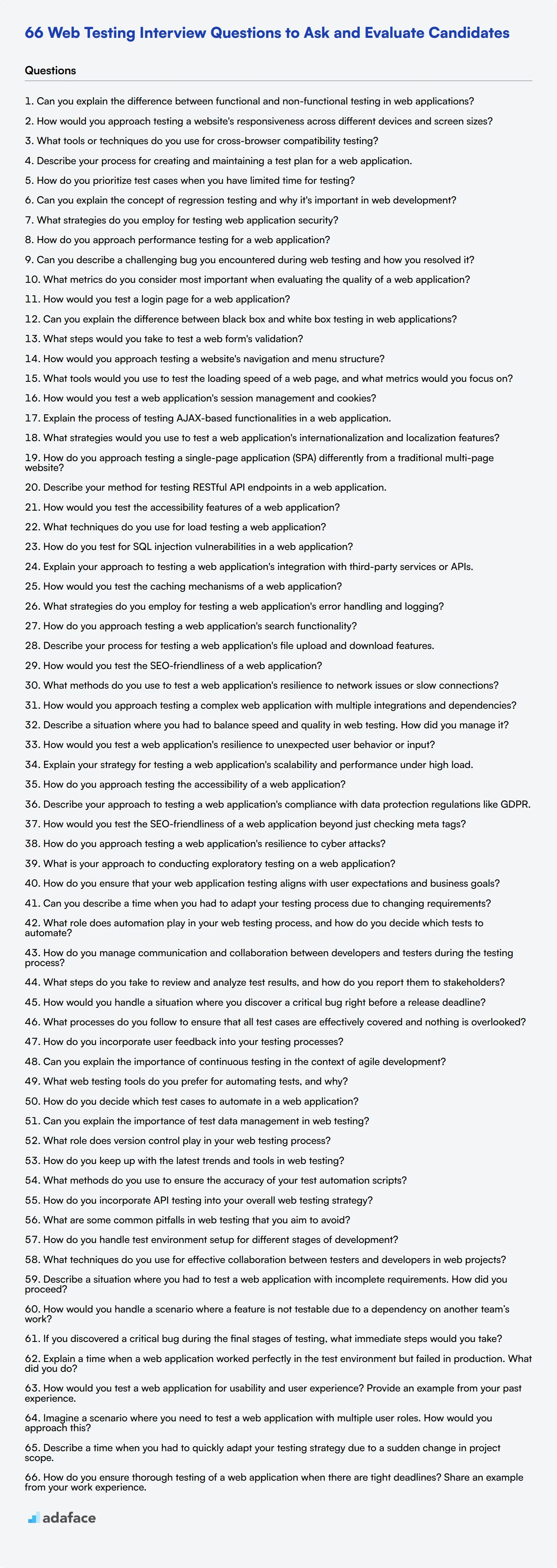Hiring the right web testers is crucial for ensuring the quality and reliability of your web applications. Conducting effective interviews helps you identify candidates with the necessary technical skills and problem-solving abilities to excel in web testing roles.
This blog post provides a comprehensive collection of web testing interview questions, categorized by experience level and specific areas of expertise. From basic concepts for junior testers to advanced scenarios for senior professionals, these questions cover a wide range of topics including testing processes, tools, and best practices.
By using these interview questions, you can thoroughly evaluate candidates' knowledge and capabilities in web testing. Additionally, consider using pre-employment assessments to complement your interview process and gain a more complete picture of candidates' skills.
Table of contents
10 common Web Testing interview questions to ask your candidates
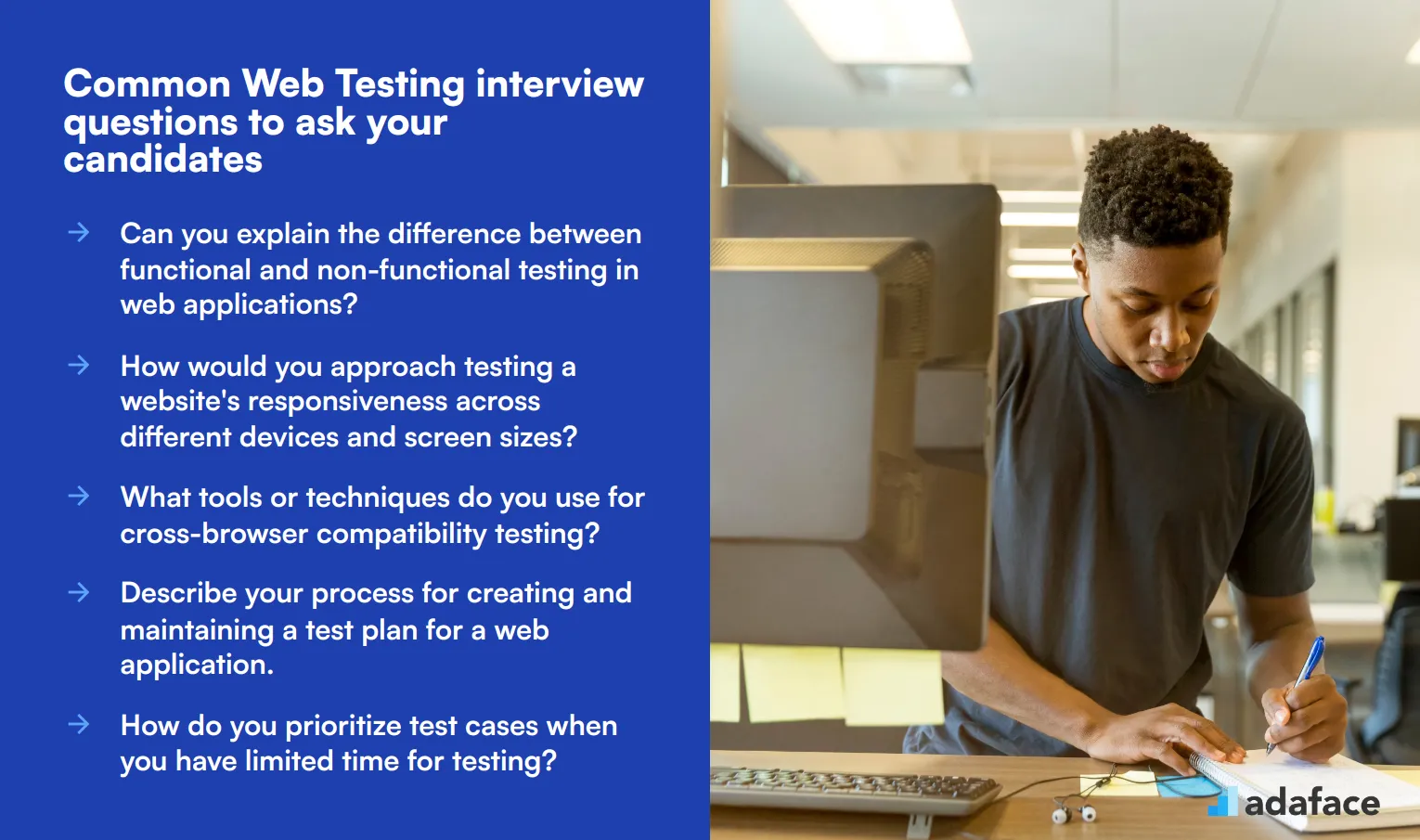
To effectively assess candidates for web developer positions, use these common Web Testing interview questions. They're designed to evaluate a candidate's understanding of crucial testing concepts and practical skills in ensuring web application quality.
- Can you explain the difference between functional and non-functional testing in web applications?
- How would you approach testing a website's responsiveness across different devices and screen sizes?
- What tools or techniques do you use for cross-browser compatibility testing?
- Describe your process for creating and maintaining a test plan for a web application.
- How do you prioritize test cases when you have limited time for testing?
- Can you explain the concept of regression testing and why it's important in web development?
- What strategies do you employ for testing web application security?
- How do you approach performance testing for a web application?
- Can you describe a challenging bug you encountered during web testing and how you resolved it?
- What metrics do you consider most important when evaluating the quality of a web application?
5 Web Testing interview questions and answers to evaluate junior testers
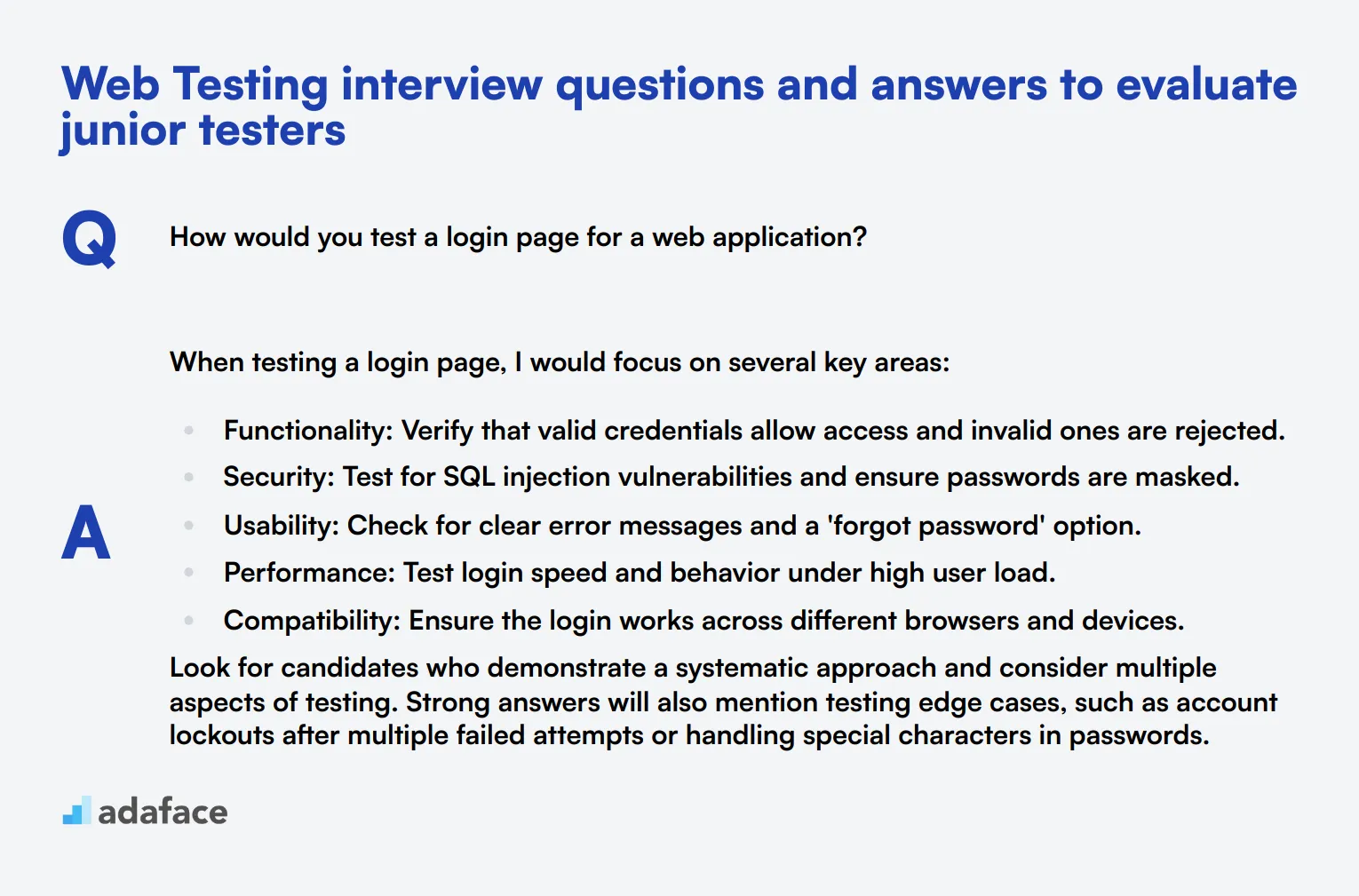
Ready to put your junior web testers through their paces? This curated list of interview questions will help you evaluate their foundational knowledge and problem-solving skills. Use these questions to gauge candidates' understanding of web testing concepts and their ability to apply them in real-world scenarios. Remember, the goal is to assess their potential, not to stump them!
1. How would you test a login page for a web application?
When testing a login page, I would focus on several key areas:
- Functionality: Verify that valid credentials allow access and invalid ones are rejected.
- Security: Test for SQL injection vulnerabilities and ensure passwords are masked.
- Usability: Check for clear error messages and a 'forgot password' option.
- Performance: Test login speed and behavior under high user load.
- Compatibility: Ensure the login works across different browsers and devices.
Look for candidates who demonstrate a systematic approach and consider multiple aspects of testing. Strong answers will also mention testing edge cases, such as account lockouts after multiple failed attempts or handling special characters in passwords.
2. Can you explain the difference between black box and white box testing in web applications?
Black box testing involves testing the functionality of a web application without knowledge of its internal code or structure. Testers focus on inputs and outputs, simulating real user interactions. White box testing, on the other hand, requires knowledge of the internal workings of the application, allowing testers to examine the code and logic directly.
Black box testing is useful for assessing user experience and finding issues from an end-user perspective. White box testing helps identify internal logic errors, improve code efficiency, and ensure proper code coverage.
A strong candidate should be able to explain the benefits and limitations of each approach. They might also mention gray box testing, which combines elements of both methods, as a middle-ground approach.
3. What steps would you take to test a web form's validation?
To test a web form's validation, I would follow these steps:
- Identify all form fields and their validation requirements.
- Test each field with valid and invalid inputs.
- Check for proper error messages when validation fails.
- Verify that the form cannot be submitted with invalid data.
- Test edge cases like empty fields, maximum character limits, and special characters.
- Ensure that valid data is accepted and processed correctly.
- Test client-side and server-side validation separately.
Look for candidates who mention testing both positive and negative scenarios. They should also consider accessibility, such as ensuring error messages are screen-reader friendly. A thorough answer might include checking for proper handling of different data types and cross-browser compatibility of validation scripts.
4. How would you approach testing a website's navigation and menu structure?
When testing a website's navigation and menu structure, I would:
- Verify all menu items are clickable and lead to the correct pages.
- Test navigation on different devices and screen sizes for responsiveness.
- Check for consistency in menu appearance and behavior across the site.
- Ensure dropdown menus and submenus function properly.
- Test keyboard navigation for accessibility.
- Verify that the current page is clearly indicated in the navigation.
- Check for a logical and intuitive menu structure.
An ideal candidate should emphasize the importance of user experience in their approach. They might also mention testing for performance issues with complex menu structures or checking for proper handling of external links. Look for answers that consider both functionality and usability aspects of navigation testing.
5. What tools would you use to test the loading speed of a web page, and what metrics would you focus on?
For testing web page loading speed, I would use tools like Google PageSpeed Insights, GTmetrix, or WebPageTest. These tools provide valuable insights into page performance and suggest optimizations.
Key metrics to focus on include:
- First Contentful Paint (FCP): Time until the first content is rendered on the screen.
- Time to Interactive (TTI): When the page becomes fully interactive.
- Total Blocking Time (TBT): Sum of time periods between FCP and TTI when task length exceeded 50ms.
- Largest Contentful Paint (LCP): Rendering time of the largest content element.
- Cumulative Layout Shift (CLS): Measures visual stability.
A strong candidate should be able to explain these metrics and their impact on user experience. They might also mention the importance of testing under different network conditions and discuss how to interpret and act on the results to improve web performance.
15 intermediate Web Testing interview questions and answers to ask mid-tier testers.
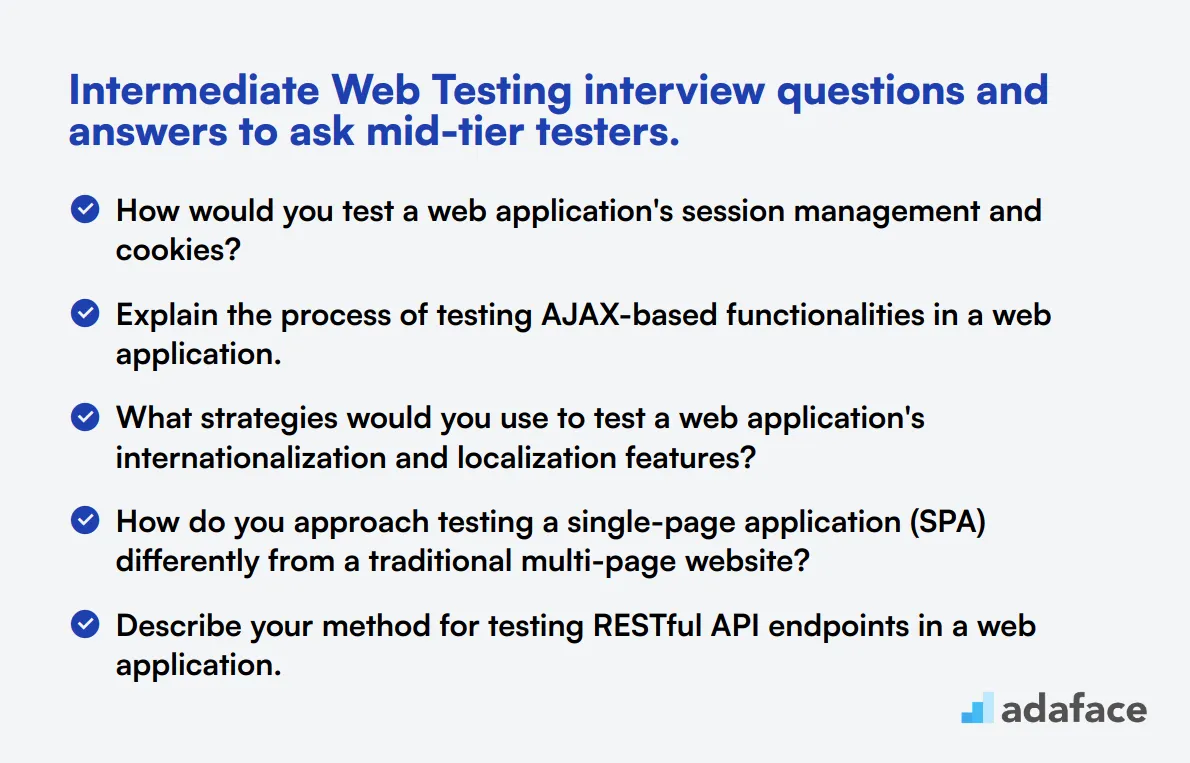
To assess the intermediate-level skills of web testing candidates, use these 15 questions during interviews. These questions are designed to evaluate a tester's practical knowledge and problem-solving abilities in real-world scenarios.
- How would you test a web application's session management and cookies?
- Explain the process of testing AJAX-based functionalities in a web application.
- What strategies would you use to test a web application's internationalization and localization features?
- How do you approach testing a single-page application (SPA) differently from a traditional multi-page website?
- Describe your method for testing RESTful API endpoints in a web application.
- How would you test the accessibility features of a web application?
- What techniques do you use for load testing a web application?
- How do you test for SQL injection vulnerabilities in a web application?
- Explain your approach to testing a web application's integration with third-party services or APIs.
- How would you test the caching mechanisms of a web application?
- What strategies do you employ for testing a web application's error handling and logging?
- How do you approach testing a web application's search functionality?
- Describe your process for testing a web application's file upload and download features.
- How would you test the SEO-friendliness of a web application?
- What methods do you use to test a web application's resilience to network issues or slow connections?
8 advanced Web Testing interview questions and answers to evaluate senior testers
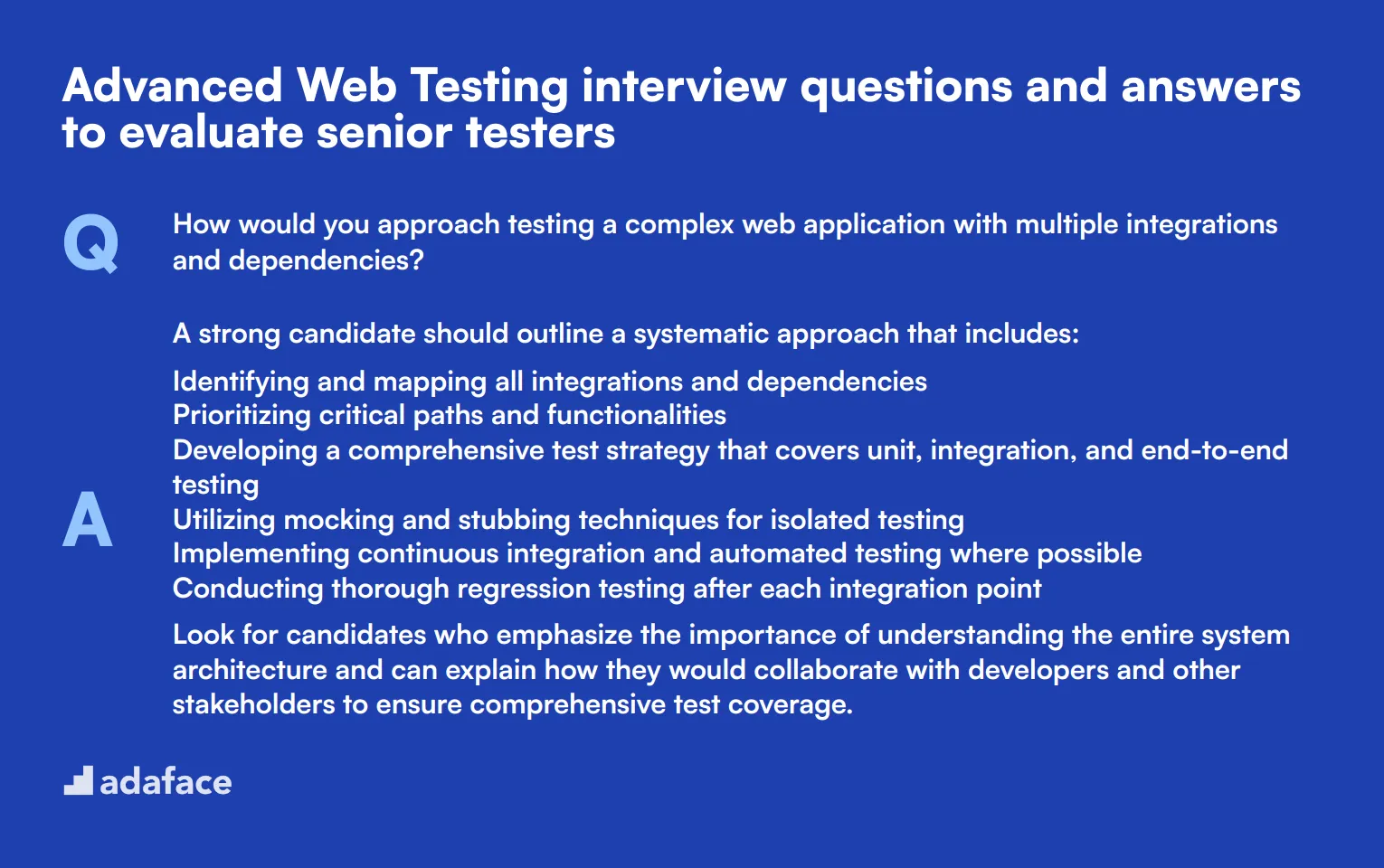
Ready to separate the wheat from the chaff in your web testing interviews? These 8 advanced questions are designed to challenge senior testers and reveal their true expertise. Use this list to evaluate candidates' deep understanding of web testing principles, problem-solving abilities, and real-world experience. Remember, the goal isn't just to stump them, but to spark insightful discussions about web development and testing practices.
1. How would you approach testing a complex web application with multiple integrations and dependencies?
A strong candidate should outline a systematic approach that includes:
- Identifying and mapping all integrations and dependencies
- Prioritizing critical paths and functionalities
- Developing a comprehensive test strategy that covers unit, integration, and end-to-end testing
- Utilizing mocking and stubbing techniques for isolated testing
- Implementing continuous integration and automated testing where possible
- Conducting thorough regression testing after each integration point
Look for candidates who emphasize the importance of understanding the entire system architecture and can explain how they would collaborate with developers and other stakeholders to ensure comprehensive test coverage.
2. Describe a situation where you had to balance speed and quality in web testing. How did you manage it?
An experienced tester should be able to share a specific example that demonstrates their decision-making skills and pragmatic approach to testing. They might describe:
- Analyzing project requirements and deadlines
- Prioritizing test cases based on risk and impact
- Implementing time-saving techniques like automated regression testing
- Communicating trade-offs to stakeholders and getting buy-in for the approach
- Focusing on critical user paths and high-risk areas
- Utilizing exploratory testing techniques for efficient coverage
Pay attention to how the candidate balances technical considerations with business needs, and their ability to make informed decisions under pressure.
3. How would you test a web application's resilience to unexpected user behavior or input?
A proficient tester should outline a multi-faceted approach that includes:
- Conducting thorough boundary value analysis and equivalence partitioning
- Implementing fuzz testing to generate random or invalid inputs
- Simulating various user scenarios, including unexpected navigation paths
- Testing with malformed data and unexpected data types
- Verifying proper error handling and graceful degradation
- Stress testing to observe system behavior under extreme conditions
Look for candidates who demonstrate creativity in their testing approach and understand the importance of quality assurance in handling edge cases and potential security vulnerabilities.
4. Explain your strategy for testing a web application's scalability and performance under high load.
A comprehensive answer should include the following elements:
- Defining clear performance benchmarks and SLAs
- Identifying key performance indicators (KPIs) such as response time, throughput, and resource utilization
- Designing realistic load scenarios based on expected user behavior
- Utilizing load testing tools to simulate concurrent users and transactions
- Monitoring system resources and identifying bottlenecks
- Analyzing results and providing actionable recommendations for optimization
Evaluate the candidate's understanding of performance testing concepts and their ability to interpret and communicate results effectively to both technical and non-technical stakeholders.
5. How do you approach testing the accessibility of a web application?
A well-versed tester should demonstrate knowledge of accessibility standards and testing methodologies:
- Familiarity with WCAG (Web Content Accessibility Guidelines) standards
- Use of automated accessibility testing tools
- Manual testing with screen readers and keyboard navigation
- Checking color contrast and font sizes
- Testing with various assistive technologies
- Involving users with disabilities in user testing sessions
Look for candidates who understand the importance of inclusive design and can explain how accessibility testing improves the overall user experience for all users, not just those with disabilities.
6. Describe your approach to testing a web application's compliance with data protection regulations like GDPR.
A thorough answer should cover:
- Understanding the specific requirements of data protection regulations
- Identifying all points of data collection, storage, and processing within the application
- Testing user consent mechanisms and privacy settings
- Verifying data encryption and secure transmission
- Checking data retention policies and deletion processes
- Testing data subject rights functionality (e.g., right to access, right to be forgotten)
- Collaborating with legal and compliance teams to ensure all requirements are met
Assess the candidate's awareness of the importance of data protection and their ability to translate regulatory requirements into testable scenarios.
7. How would you test the SEO-friendliness of a web application beyond just checking meta tags?
An experienced tester should mention various aspects of SEO testing:
- Analyzing URL structure and site architecture
- Checking page load speeds and mobile responsiveness
- Verifying proper use of header tags (H1, H2, etc.)
- Testing internal linking structure and anchor text
- Checking for broken links and proper redirects
- Verifying XML sitemaps and robots.txt configuration
- Testing structured data implementation (schema markup)
- Checking for duplicate content issues
Look for candidates who understand that SEO is not just about on-page elements but also involves user experience factors and technical aspects of web development.
8. How do you approach testing a web application's resilience to cyber attacks?
A security-conscious tester should outline a comprehensive approach:
- Conducting vulnerability scans and penetration testing
- Testing for common vulnerabilities like XSS, CSRF, and SQL injection
- Verifying proper implementation of authentication and authorization
- Checking for secure session management and proper logout functionality
- Testing input validation and sanitization
- Verifying secure communication protocols (HTTPS)
- Simulating various attack scenarios (e.g., brute force, DDoS)
Evaluate the candidate's understanding of web security principles and their ability to think like an attacker while testing. Look for awareness of the latest security threats and best practices in web application security.
10 Web Testing interview questions about testing processes
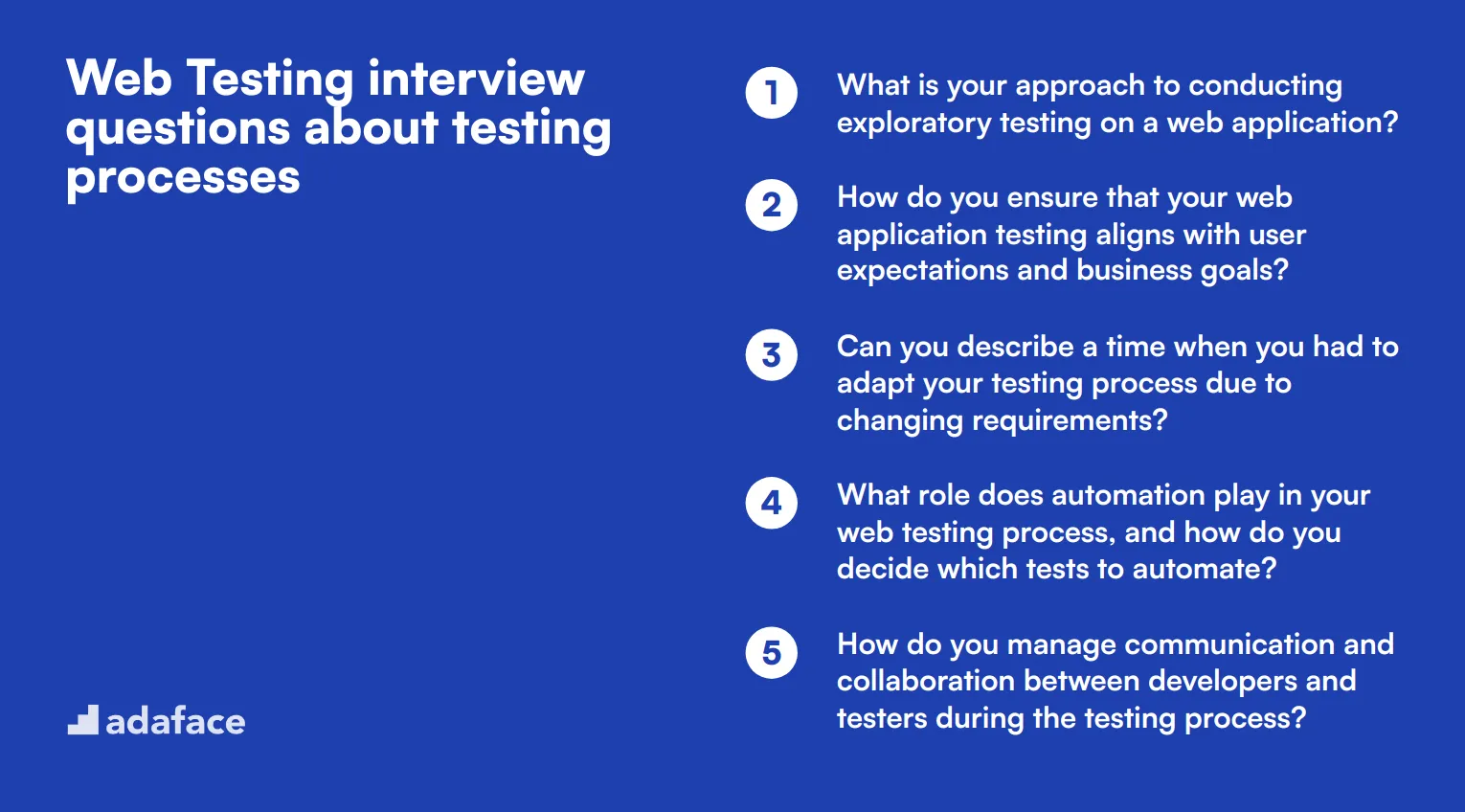
To effectively assess candidates' understanding of web testing processes, utilize this list of targeted interview questions. These inquiries can help you determine if applicants possess the practical skills needed for roles in web development or QA testing, such as a web developer.
- What is your approach to conducting exploratory testing on a web application?
- How do you ensure that your web application testing aligns with user expectations and business goals?
- Can you describe a time when you had to adapt your testing process due to changing requirements?
- What role does automation play in your web testing process, and how do you decide which tests to automate?
- How do you manage communication and collaboration between developers and testers during the testing process?
- What steps do you take to review and analyze test results, and how do you report them to stakeholders?
- How would you handle a situation where you discover a critical bug right before a release deadline?
- What processes do you follow to ensure that all test cases are effectively covered and nothing is overlooked?
- How do you incorporate user feedback into your testing processes?
- Can you explain the importance of continuous testing in the context of agile development?
10 Web Testing interview questions about tools and best practices
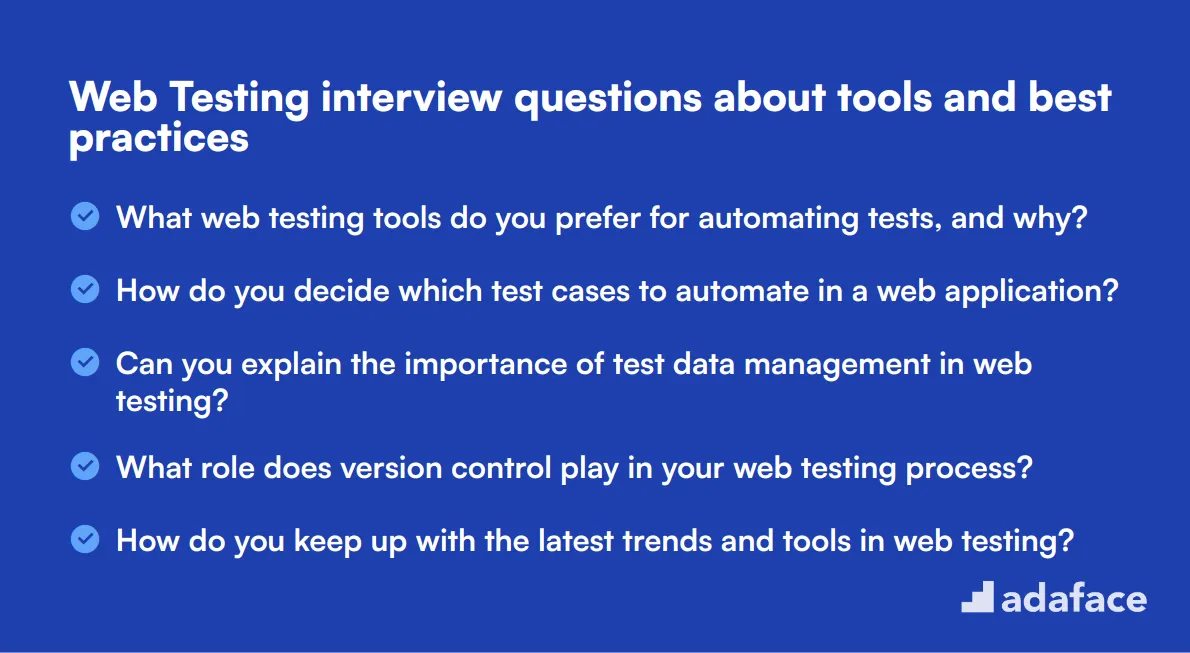
To assess whether candidates are equipped with the right tools and best practices for web testing, use this list of focused questions. They can help you gauge practical skills and knowledge that are essential for success in roles like a web developer.
- What web testing tools do you prefer for automating tests, and why?
- How do you decide which test cases to automate in a web application?
- Can you explain the importance of test data management in web testing?
- What role does version control play in your web testing process?
- How do you keep up with the latest trends and tools in web testing?
- What methods do you use to ensure the accuracy of your test automation scripts?
- How do you incorporate API testing into your overall web testing strategy?
- What are some common pitfalls in web testing that you aim to avoid?
- How do you handle test environment setup for different stages of development?
- What techniques do you use for effective collaboration between testers and developers in web projects?
8 situational Web Testing interview questions for hiring top testers
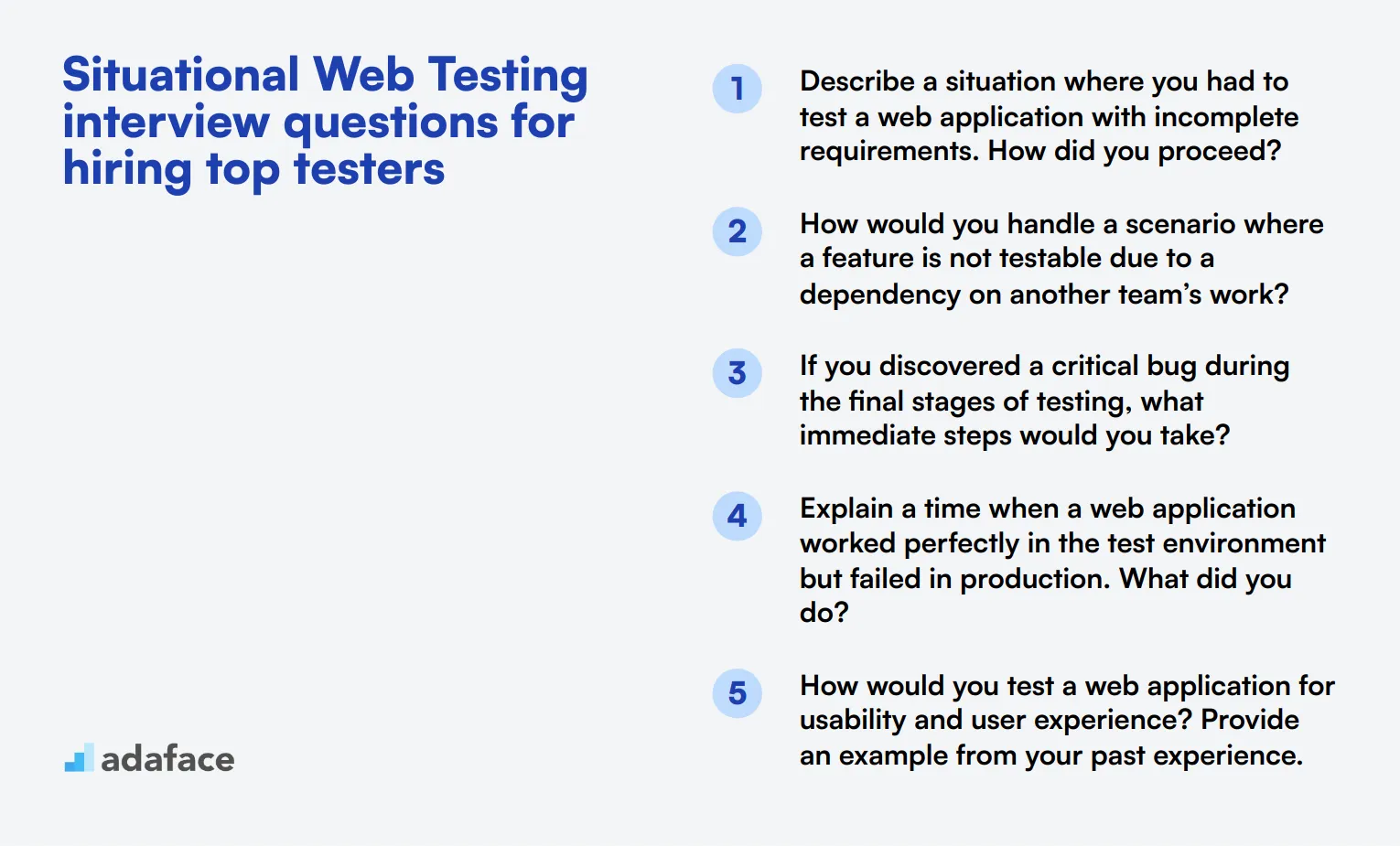
To identify top-tier web testers, utilize these situational interview questions during your hiring process. Whether you're assessing problem-solving abilities or understanding how candidates handle real-world scenarios, these questions will help you gauge their skills effectively. For more insights on hiring, check out this web-developer job description.
- Describe a situation where you had to test a web application with incomplete requirements. How did you proceed?
- How would you handle a scenario where a feature is not testable due to a dependency on another team’s work?
- If you discovered a critical bug during the final stages of testing, what immediate steps would you take?
- Explain a time when a web application worked perfectly in the test environment but failed in production. What did you do?
- How would you test a web application for usability and user experience? Provide an example from your past experience.
- Imagine a scenario where you need to test a web application with multiple user roles. How would you approach this?
- Describe a time when you had to quickly adapt your testing strategy due to a sudden change in project scope.
- How do you ensure thorough testing of a web application when there are tight deadlines? Share an example from your work experience.
Which Web Testing skills should you evaluate during the interview phase?
Evaluating a candidate's web testing skills in a single interview can be challenging. While it's impossible to cover every aspect of a candidate's experience, focusing on core skills can help you identify their potential fit for your team. This section outlines essential web testing skills to assess during the interview phase.
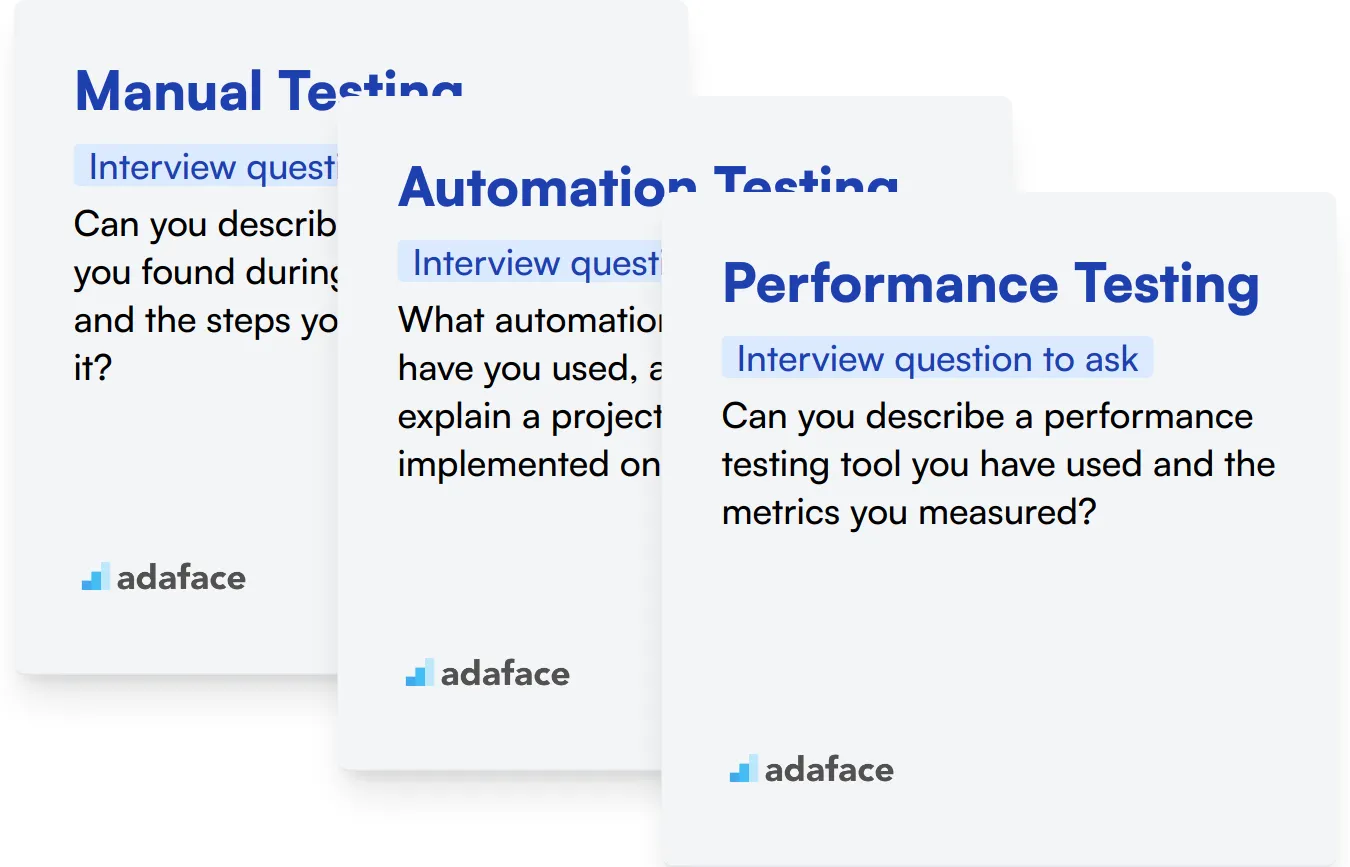
Manual Testing
To assess manual testing skills, consider using an assessment test that includes relevant multiple-choice questions. This can provide an objective measure of a candidate's knowledge and capabilities in manual testing principles. You can find a suitable test here.
Additionally, you can ask targeted interview questions to evaluate a candidate's manual testing skills effectively.
Can you describe a recent bug you found during manual testing and the steps you took to resolve it?
Look for a clear explanation of the bug, the testing process undertaken, and how they communicated the issue to the development team. Their response should demonstrate analytical thinking and collaboration.
Automation Testing
To evaluate automation testing skills, use an assessment test that features relevant MCQs tailored to automation tools and methodologies. Such tests can give you insight into a candidate’s familiarity with automation practices.
You can complement this by asking interview questions that specifically target their experience with automation testing.
What automation testing tools have you used, and can you explain a project where you implemented one?
Pay attention to the candidate’s familiarity with various tools, their understanding of automation testing processes, and their ability to articulate the impact of automation on the project.
Performance Testing
Consider using an assessment test that includes multiple-choice questions focused on performance testing strategies. This can help you gauge the candidate's theoretical knowledge and practical insights.
Additionally, you can ask targeted questions to evaluate their hands-on experience with performance testing.
Can you describe a performance testing tool you have used and the metrics you measured?
Look for a detailed response that covers the tool’s capabilities, the specific metrics monitored, and how the performance data influenced their testing outcomes.
Streamline Your Hiring with Web Testing Skills Assessments and Targeted Interview Questions
When aiming to hire professionals adept in Web Testing, it's important to verify that candidates possess the necessary skills accurately.
The most reliable way to assess these competencies is through specialized skills tests. Consider utilizing tests like our Web Testing Online Test or the Selenium Online Test to evaluate your candidates effectively.
After administering these tests, you can confidently shortlist the top candidates. These individuals are then ready to be invited for in-depth interviews, ensuring you meet only the most qualified applicants.
To begin this streamlined hiring process, you can create an account or learn more about our offerings on the Adaface Sign Up Page or the Online Assessment Platform.
Web Testing
Download Web Testing interview questions template in multiple formats
Web Testing Interview Questions FAQs
Look for candidates who have strong analytical skills, attention to detail, and familiarity with web testing tools and methodologies.
Ask basic questions about web testing concepts and tools, and evaluate their problem-solving skills and enthusiasm for learning.
You should ask intermediate questions that assess their practical experience with testing, including specific scenarios and their approach to problem-solving.
Focus on advanced questions that evaluate their expertise in web testing, their experience with different tools, and their ability to lead a testing team.
Situational questions help you understand how candidates react in real-world scenarios, revealing their problem-solving abilities and critical thinking skills.
Use targeted interview questions and web testing skills assessments to efficiently evaluate candidates' capabilities and identify the best fit for your team.

40 min skill tests.
No trick questions.
Accurate shortlisting.
We make it easy for you to find the best candidates in your pipeline with a 40 min skills test.
Try for freeRelated posts
Free resources




